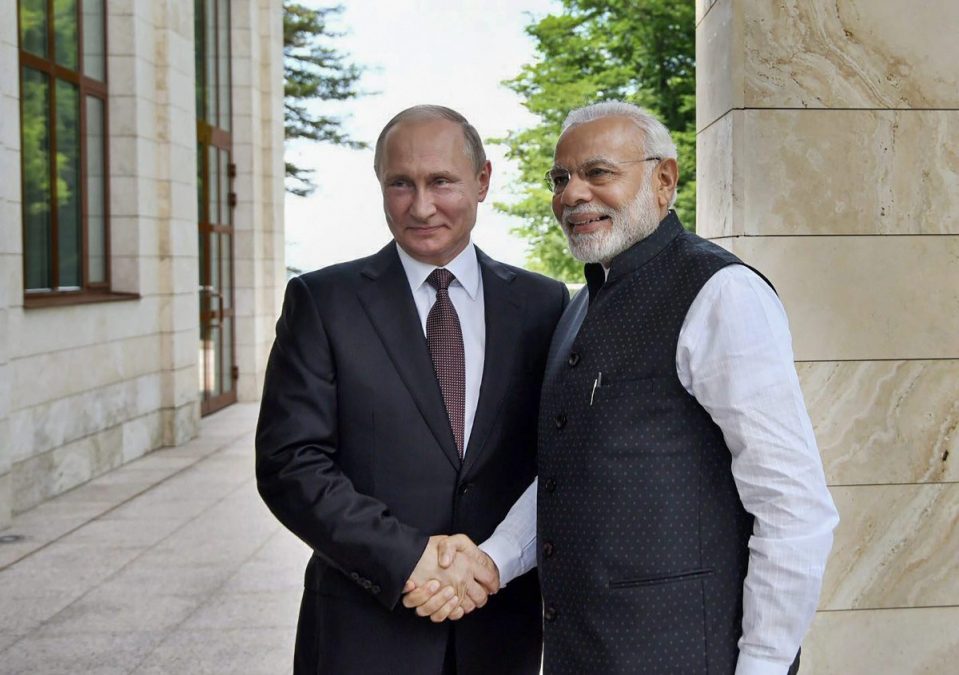
SOURCE: THE PRINT
India wants Russia to join the US-led Indo-Pacific initiative as New Delhi sees it as the next logical step to boost bilateral strategic ties with Moscow and mark 20 years of their renewed partnership, multiple sources told ThePrint. The Indo-Pacific initiative is a strategic grouping, seen largely as an attempt to counter China. New Delhi believes that if Russia joins the Indo-Pacific framework, it will no longer be seen as a grouping that is led by the US, something that Moscow has been protesting for long.
The matter was discussed during a recent phone-call between Russian Deputy Foreign Minister Igor Morgulov and Ambassador of India to Russia D. Bala Venkatesh Varma and in many other frequent diplomatic dialogues that have been taking place between both sides, sources said.
During the lockdown period, Modi and Putin have also spoken a couple of times. India has reportedly told Russia that just as New Delhi supports Moscow’s Greater Eurasia, it should also join hands under the rubric of Indo-Pacific, and not see this merely as the US’ divisive strategy.
Diplomatic sources told ThePrint that India believes in order to address the challenges in a post-Covid world as countries are increasingly aligning with each other, it is “critically important” that Moscow joins the Indo-Pacific framework and make it a true grouping of “like-minded countries” that believe in freedom of navigation under a rule-based order.
“Today we face more international lawlessness than we faced 10 years ago or 20 years ago,” Varma said at a webinar recently adding that India-Russia bilateral ties are now “better placed” than other relationships in this “troubled world”.
“We have repeatedly said that just as India has an interest in the stability of the Eurasian continent. We would very much like Russia to be more involved in the Indo-Pacific,” Varma had said. “I think the differences between India and Russia are vastly exaggerated. My sense is that there are far more commonalities than there are issues that divide us.”
According to P.S. Raghavan, former Indian envoy to Russia, and now head of the National Security Advisory Board, Prime Minister Narendra Modi has time and again stated that the Indo-Pacific is not aimed at confronting China but to implement a rule-based order in the region.
“Russia is also aware of Beijing’s growing aggressiveness, but it needs China for economic reasons,” he said. “So by joining the Indo-Pacific it will come closer to India, because India does not see Indo-Pacific as an initiative to confront China.”
Next 20 years will be challenging for both India, Russia
Ties between New Delhi and Moscow have undergone a sea change in the past decade as India began to tilt more towards the US thereby diversifying its defence purchases and not solely relying on the Russian armaments.
In an effort to give a fresh lease of life to the flagging relationship, Russian President Vladimir Putin is expected to visit India in October this year notwithstanding the ongoing Covid-19 pandemic.
Moscow also played a key role this time between India and China in bringing the temperatures down on both sides, sources said.
New Delhi sees Moscow’s role in the ongoing unprecedented standoff with China at the western sector of the Line of Actual Control (LAC) to be “very helpful”.
According to an official, despite Russia’s own growing bilateral relationship with China, Moscow did not shy away in assuring India with emergency supplies of armaments if matters deteriorated.
In the last four months, since the onset of the Covid-19 outbreak, Prime Minister Narendra Modi and President Putin have spoken a couple of times, while Defence Minister Rajnath Singh undertook a trip to Russia for its ‘Victory Day’ parade, the first high-level visit from India to any country during the pandemic.
Despite an unprecedented violent clash between Indian and Chinese troops in June, in which India lost 20 of its soldiers, External Affairs Minister S. Jaishankar took part in the virtual Russia-India-China (RIC) meeting so as to not disrupt the equation with Russia, according to sources.
India and Russia have also jointly opposed China’s so-called assertion of power through the belt and road initiative (BRI).
While Indian continues to oppose the BRI, Russian Foreign Minister Sergei Lavrov did not attend a virtual meeting of the BRI hosted by Chinese Foreign Minister Wang Yi earlier this month.
India’s diplomatic community is well-aware of the closeness in the ties between Russia and China, which Putin openly admitted last year at the Valdai Discussion Club where he said it is “impossible” to contain Beijing.
But in the recent face-off, by promising India with emergency armaments, Moscow “has given a signal to China” that Beijing alone cannot assert power in the region.
Russia has also acknowledged that despite the threat of US sanctions under the Countering America’s Adversaries Through Sanctions Act (CAATSA), India has remained firm on buying the S-400 Triumf air defence missiles system.
“All these are signs that India and Russia continue to remain close friends and depend on each other during a crisis situation,” Raghavan said. “So the next 20 years of the relationship has to be carefully crafted because power shifting will take place rapidly in a post-Covid world. Next 20 years will be challenging for both.”






